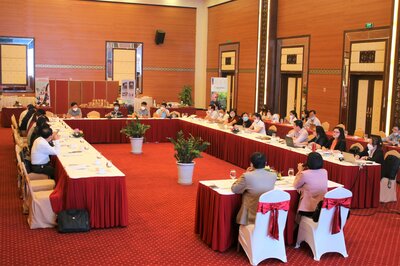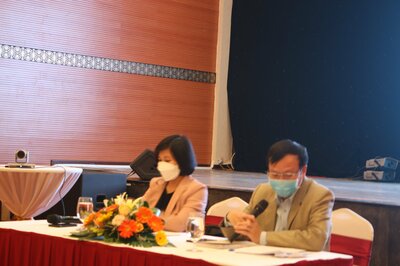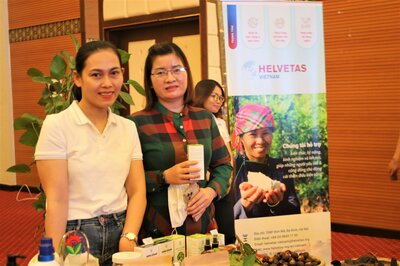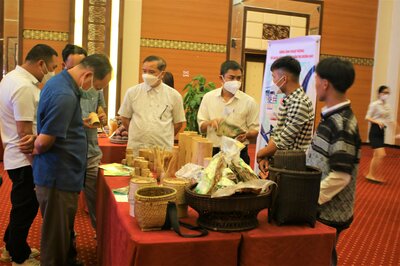On 25 March 2022, Helvetas Vietnam organized a workshop to share the survey results on potential value chains, ecotourism, vocational training, and opportunities to combine them with government support programs in Quang Tri province. 3 value chains and 1 community-based ecotourism chain have been introduced. The value chains will be developed in 2 districts of Huong Hoa and Dakrong to support communities to actively develop sustainable livelihoods and reduce dependence on forests.
This is an activity within the component "Promote Conservation-Friendly Enterprises in Forest Dependent Communities", part of the Project “Vietnam Biodiversity and Forest Conservation” (VFBC) funded by the United States Agency for International Development (USAID). Helvetas Vietnam is implementing this Project together with WWF, the Ministry of Agriculture and Rural Development, and many other partners in 5 provinces and 3 national parks in Vietnam.
Quang Tri province, which is located in the southern part of the North Central region, is an area of high biodiversity, with many specific, endemic, and unique characteristics. Currently, in the area, two Nature Reserves have been established, namely Dakrong Nature Reserve and Bac Huong Hoa Nature Reserve. Dakrong Nature Reserve is located in the south of Dakrong district, the endpoint of the majestic Truong Son Bac range, and by the east of the Dakrong river. Dakrong Nature Reserve is an area of high biodiversity with 4 types of evergreen closed forests, home to more than 1,400 species of higher plants and more than 300 species of animals. Bac Huong Hoa Nature Reserve is located in the north of Huong Hoa district, with an area of about 25,000 hectares of forest land. These reserve areas provide ecosystem values and serve as the watershed protection forest for the Ben Hai, Rao Quan, Hieu, and Se Phang Hieng rivers. Dakrong and Bac Huong Hoa conservation areas are home to many populations of rare animals and plants such as striped rabbit, Central gibbon, Truong Son muntjac, red-shanked douc, Edwards's pheasant, Central partridge, Ha Tinh langur, etc.
Over the years, the situation of illegal wildlife trade and consumption in Vietnam in general and Quang Tri, in particular, remains unresolved. The reason is that the communities around the nature reserves are still partly dependent on forest exploitation and wildlife products. In addition to changing the community's awareness and habits of harvesting and using forest products, creating new livelihoods to end the chain of dependence on forests is one of the important strategies to improve the effectiveness of biodiversity conservation activities.
Since 2021, Helvetas Vietnam has conducted a survey on opportunities to create sustainable livelihoods for buffer zone communities through the development of value chains of non-timber forest products and high-value agriculture, community-based ecotourism, with a particular focus on training and sustainable employment opportunities as well as new job opportunities for groups of hunters and illegal loggers around conservation areas.
The development of value chains of non-timber forest products, high-value agriculture, and community-based ecotourism links to the businesses, upon market needs and standards from the start. The survey also received consultation and companionship of enterprises to ensure the feasibility and sustainability of the chain. The comprehensive market system approach helps the expert team identify bottlenecks related to institutions, practices, and supply services of each chain to recommend appropriate interventions.
The good news is that the survey in Huong Hoa and Dakrong has identified many potential value chains that can help communities develop their livelihoods, such as the cultivation of passion fruit and clean coffee, or the production of herbal essential oils. At the same time, some places can develop ecotourism, combined with the introduction of indigenous culture. “When choosing a chain of high-value forest/agricultural products, we have to find out the potential market demand, local planning of raw material areas, target groups, their ability to increase their income when participating in the chain, and the expected size of the market development. It is important to have the companionship and investment of the private sector from the very beginning to ensure the link between production and the market”, said Ms. Nguyen Tu Anh, Helvetas Office Manager, Acting Head of Sub-component 6 of VFBC Project.
For the development of ecotourism, besides assessing the attractiveness and uniqueness of the natural and cultural landscape, other criteria are also considered. Those criteria include visitor safety, accessibility and connectivity to sites, and biodiversity conservation. Similar to building agro-forestry product value chains, the investment participation of the community and businesses are also prerequisites.
At the workshop, 04 company directors also presented plans to support the community in building material areas, manufacturing and processing products as well as their market development orientation. Ms. Le Thi Hue, Director of Tan Hop Cooperative, one of the Project’s business partners shared “Our cooperative is developing 10 hectares of passion fruit and connecting with dozens of households in Tan Hop, Huong Tan, Huong Phung, Huong Loc communes of Huong Hoa district. The initial household participants will receive the support of 50% of the value of seedlings and fertilizer to grow passion fruit. We are also proposing a branding plan for the product with to expand the market and the network of participating households. It is expected that during the implementation of the project, the cooperative will create 300-500 jobs with stable incomes”.
In addition to the enthusiastic participation of businesses, the project also received support from the local government agencies as it aligns with local development policies. Ms. Nguyen Hong Phuong, Deputy Director of Quang Tri Department of Agriculture and Rural Development affirmed “The approaches of the USAID-funded Biodiversity Conservation Component that aim to develop sustainable livelihood for communities living in the vicinity of protected areas are well-suited to the province's orientation for agricultural development and biodiversity conservation. In the coming time, the Project Management Board of Quang Tri province will continue to coordinate with WWF-Vietnam to implement the Project activities in the area.”
Together with activities in Quang Tri, similar activities are also being carried out by Helvetas Vietnam in Quang Binh, Quang Nam, Thua Thien Hue, and Lam Dong provinces with the goal of developing 40 communities to be linked to and work collaboratively with companies, 9 forest-dependent villages are linked and working collaboratively with tourism operators, and livelihoods of nearly 8,000 forest-dependent people to be improved by 2026, thereby diminishing forest exploitation and biodiversity destruction activities.
See the full article in Vietnamese here.





